“Listen, whatever you see and love, that’s where you are.” – Mary Oliver, “Luke’s Junkyard Song”
I’m driving down I-30 toward one of the most godforsaken areas of Fort Worth on a stormy-looking afternoon. Traffic isn’t bad, but suddenly someone pulls alongside me and repeatedly blasts their horn. Slowly and cautiously, I turn my head, and I realize that it’s Heather Ethridge-Killen, a local homeless activist.
Ethridge-Killen enthusiastically waves and then zips down the highway and out of sight in her white SUV. Days earlier, she agreed to be my tour guide for a story on homeless people and their pets. She helps the homeless through her street outreach PHAST (Project Heather Apollo Street Team), a partnership with Apollo Support & Rescue for Abandoned Dogs in Justin.
I’m relieved to see her because I’m running slightly behind schedule. I stopped to talk to a neighbor, Kathy, just as I was getting ready to leave. Kathy told me she has to move and she’s worried about her three cats. I thought she simply meant that moving sucks, but I was wrong. I know Kathy well enough to say hello and exchange small talk in passing, but that’s all. Every time I see her, she’s raving about her cats or how much she loves Jesus. One time, Kathy showed me a poster-sized tapestry she made of Jesus wearing a crown of thorns, his eyes looking up and his face wrenched in agony.
But I forget about Kathy as soon as I exit the freeway and pull up to a traffic light just off Beach Street. A homeless man is standing on the corner with two puppies on leashes, and the puppies are rambling all over the place. At a red traffic light ahead of me, I see a white car door swing open. Ethridge-Killen leans out and hands the man a huge yellow bag of dog food. He’s smiling and shaking his head as if he can’t believe what just happened.
Ethridge-Killen, 30, has a straightforward reason for helping the homeless. “I saw people and animals who were suffering, and it bothered me,” she told me. “There are homeless people everywhere. They’re all around us. It’s just that no one’s looking for them. If you look, you’ll see them.”
The national nonprofit group Pets of the Homeless in Carson City, Nevada, estimates that 3.5 million people are homeless every year in the United States. A total of up to 875,000 pets are on the streets with their homeless guardians, according to the organization. The problem extends to Fort Worth, where some of the homeless would rather live outdoors with their pets than jump through hoops at a shelter or try to pay hefty pet deposits at apartments they really can’t afford.
*****
Ethridge-Killen meets me in the parking lot of a restaurant on Lancaster Avenue and drives us to a wooded area a couple of miles away, where a group of homeless people are living with their two dogs. We’re riding down a dirt and gravel roadway that leads to their encampment when she suddenly turns to me and says, “Oh, shit!”
A police car is slowing down by the roadway’s entrance, and we had just breezed by a “No Trespassing” sign.
Ethridge-Killen steps on the gas, and we go bouncing down the dirt path. She makes a quick U-turn to hide her car behind a group of trees, but that lands us in a large plot of thick mud. She guns the car forward and back, but the wheels are just spinning, and mud is flying everywhere. Worse, we’re sinking. The homeless people I’m here to meet º two women and two men – emerge from across a field after they hear the commotion.
Ethridge-Killen opens her car window and yells out to them, “Grab some boards! We’re sinking!”
The two men go back into their encampment and almost instantly reappear with two 7-foot planks. Try getting that kind of roadside assistance anywhere else. Sissy, one of the group’s two pit bull mixes, joins them and starts running toward the car.
“She’s friendly?” I ask Ethridge-Killen.
“Yes.”
I get out of the car and greet Sissy, who’s wearing a wide, goofy-dog smile. Her long white tail is wagging back and forth like a giant windshield wiper. Buddy, the group’s other pit bull mix, wants no part of this crazy scene. He’s looking very regal as he sits at the entrance to the encampment. Buddy’s back is perfectly straight, his head is held high, and he’s focused on guarding his post. Buddy is all business.
I decide my job will be keeping Sissy away from the car’s spinning wheels. I’m chasing after her with my arms stretched out, and she’s is running back and forth, dodging me like this is the best game ever. The whole time, I’m trying to think of an explanation to offer the police if they decide to drive down here and ask us what the hell is going on because the truth – “we’re working on a story” – sounds like a smartass answer. Fortunately, the police never show.
The group wedges the planks under the tires, and after a lot of pushing, the Ford Escape breaks free and lands on dry land. One of the men who was pushing the SUV is sweating profusely and bends in half as he tries to catch his breath.
Their actions back up what Ethridge-Killen previously told me. They’re good people, she said. She brings them stuff, but she’s also a friend and an ally. In their world, real friends are for keeps, no matter what, and that includes the four-legged kind.
Finally, we head to their camp, where I’m introduced to two couples: Sabrina and Bob and Lorelei and John. All of them ask to keep their last names out of the story. One of them may have unpaid tickets or an outstanding warrant, but mostly it’s part of their lifestyle, they tell me. Last names, zip codes, and social security cards aren’t required out here. We’re also keeping the exact location of the group a secret, so they can avoid being harassed or displaced.
Sabrina, 32, is the top dog mom, and Buddy is her boy. “That dog is my baby, man,” she tells me.
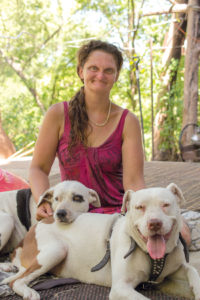
*****
Sabrina met Buddy about eight years ago on a street corner on Beach Street, in the heart of Fort Worth’s homeless community. She fed Buddy a few cocktail sausages out of a can, and he followed her around for a week “with no leash.” They were kindred spirits right away, because he was a homeless dog, and she was a homeless woman, both of them just trying to survive.
“I’ve been homeless for a long time,” said Sabrina, who landed on the streets after leaving an abusive relationship. “Buddy was homeless on the streets, just like me, and I took him in. He was so horrible-looking and so tiny and so sad.”
Buddy is now a stately-looking dog that Sabrina describes as a protector, friend, and comforter. She’s convinced that Buddy is talking to her. “He likes to talk to people,” she said. “He carries on a conversation with you. If you talk to him, he’ll say, ‘Rawr, rawr, rawr.’ If I give him a sausage, he’ll say ‘rawr,’ and if I ask him to give me a high five, he’ll give me his paw.”
Sabrina says that Buddy and her boyfriend, Bob, are the only things she has left in this world. Most of her time is spent taking care of Buddy and making sure he has what he needs, she said. The dogs sleep in the beds inside the tents and eat dinner with their guardians every night. Buddy’s stomach has been upset lately, so Sabrina is giving him honey every morning.
“I get up in the morning and give Buddy his honey for his stomach, and then I go to work,” Sabrina said. “I gotta do all the running around. And then I feed the dogs and I cook dinner and I go to bed. That’s my whole day.”
I ask what kind of work she does. “I fly a sign, panhandle,” Sabrina said. Some days, she rides her bicycle two miles each way to Walmart just to buy dog food. The dogs always eat first, she says.
Like a true best friend, Sabrina tells Buddy everything. “I get everything off my chest, and I do not have any regrets or any worries,” she explains. “He talks back to me without judging me, and I know he understands. If I get upset or emotional or if I have a bad mental health day, he’ll come up and nudge me until I pet him. It’s like he’s saying, ‘Hey, mom. I love you. I love you.’ It’s amazing. I never met a dog like Buddy-Buddy. I could have the worst day in the world and come and talk to Buddy and have the best day in the world.”
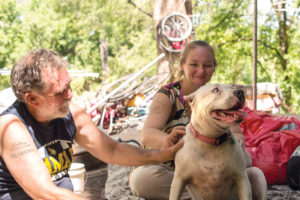
Lorelei and John joined up with Sabrina and Bob last December, and they’ve all stayed together since then. Lorelei, 40, said the dogs are good medicine. “They help me a lot because they have such personality, and it’s nice to be able to spend the time with them,” she said. “If I have a bad day, I can see Buddy or Sissy – either one – and they just kind of look at me like, ‘OK, well, what are you going to do to fix it?’ I can have the worst day in the world and then pet them for a little bit, and they’ll be happy like nothing’s going on, and that makes all of the difference.”
To help provide for themselves and the dogs, Lorelei and John also work, but they call themselves greeters, not panhandlers. Every day, they go up the street and sit outside a restaurant, where they say hello to all of the customers and tell them to have a nice day.
“If they choose to give us something, then they choose to give us something,” Lorelei said. “We don’t have a sign or anything. Less likely to get in trouble that way. We get what we get. We don’t ask for it. It’s just out of generosity from people, and then we come home just after dark, and of course we’re greeted by Buddy and Sissy. We call them the welcoming committee.
“And we just talk to them,” she continues. “We come home and go to sleep and do it all over again. If we’re here during the day, and we’re up, we’re running around with the two of them, playing ball, you know?”
The dogs are also a source of protection, especially for the women. Sabrina and Lorelei both said they’ve been sexually assaulted, something that’s often a brutal reality for women living on the streets. But no one is getting by the dogs, Sabrina said.
“If someone tries to come down here and come at me, Buddy will get them,” she said.
While we’re talking, dark clouds are rolling in overhead, and someone mentions that it looks like it’s going to rain. John looks up at the sky with a slight smile on his face. “It’s not gonna rain,” said John, who calls himself a weatherman. “At least not yet.” He says he has no formal training, just years of experience in looking up and reading the sky.
At one point, Lorelei pulls me aside and says she wants to show me something. We walk over to a steep creek embankment that runs along the edge of their camp. Across their living area are seemingly endless stacks and piles of stuff: clothes, books and other indiscernible items.
“This is the view I wake up to every day,” Lorelei said. But she’s looking beyond the stuff that’s scattered everywhere. Lorelei is referring to the creek, something she sees as a point of beauty amid all of the chaos and disarray in her life. At the base of the embankment is a large tree.
“And the turtles come up there and sunbath,” Lorelei said. “Big turtles. The tree out there gets covered in them. And it’s so beautiful. It’s peaceful. You can look over here, and you can see the city lights and then you can see serenity. You can see that you’re secure. You’re safe.
“Even in the wintertime, when it’s just brown, the coldest of cold, the turtles still come out. They can sit there in the freezing cold weather, and they’re just like you, except they live in water.”
Extreme hot and cold temperatures are dangerous for Lorelei, because they seem to aggravate her seizures, she said. Her current lifestyle was a difficult adjustment after being someone who used to take care of a home and hold down multiple jobs.
“I can’t even hold down one job now,” she said.
For Lorelei and John, their situation could improve soon. He’s a military veteran, and the couple recently learned that they’re in line to receive housing. Normally, that’d be great news, but Lorelei is having trouble accepting the idea of getting an apartment. She wonders what might happen if she’s there alone.
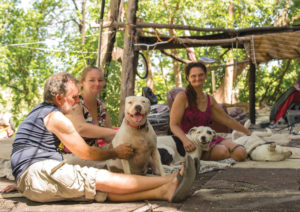
“I’m coming out here,” Lorelei said. “That way, I know I’m with somebody I can trust, so that if I do have something go on, I’m not by myself. The reality of it is that I’m scared to stay in an apartment by myself because I can’t scream. At least here, if I scream, either the dogs are coming or Sabrina or Bob are coming. I feel secure in knowing somebody’s coming, instead of nobody.”
The losses all of them have faced are taking a toll. Lorelei said that after she gets the apartment she wants to come out on the weekends, “so we’re not always apart. I can’t afford to lose another friendship. I can’t afford to lose a family. We are family. We stick together.”
Sabrina also hopes for a life that includes a traditional home – one with four walls, a permanent roof over her head, and maybe a fenced-in yard for Buddy.
“I’d like to have a home,” Sabrina said. “Don’t get me wrong. No, I do have a home. I just don’t have a house. I have two tents, but I don’t have four normal walls. And I have my dog, and I wouldn’t give Sissy up, either. That dog has grown on me so much.”
Critics would say the current arrangement is far from ideal, but it doesn’t mean they love their pets any less than a suburban soccer mom does. When asked about its position on the homeless having pets, the national ASPCA, headquartered in New York City, sent me the following statement via email.
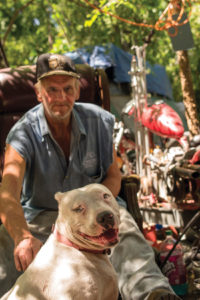
“The ASPCA believes that pets and people belong together; that financial circumstances alone are not reliable indicators of the capacity to love and care for a companion animal, and that strong bonds between people and pets make for stronger communities. … We have also learned that people who are financially disadvantaged do not love their pets any less than those with more wealth. Surveys of homeless pet owners reveal a level of attachment to their pets that may be greater than that reported by pet owners who live in traditional residences.”
Like many homeless pet owners, the Fort Worth group relies on free or reduced vaccines and other low-cost veterinary services. And luck, a lot of luck and prayers that the dogs don’t get ill.
*****
The afternoon is turning into early evening, and Ethridge-Killen has to leave – she gets up for work before dawn. We drive back to the restaurant, and then I head back to my suburban utopia – or is it? It starts pouring as soon as I arrive home. As I walk past the apartment complex laundry room, I notice that the light is off and the door is half-closed. I push open the door, turn the light on and realize there’s someone lying on the floor.
“Kathy?”
My neighbor sits up on her elbows and finishes the story I wasn’t able to hear earlier in the day. “I was evicted from my apartment,” she said. “I missed a lot of work because I’ve been sick. There’s something wrong with my pancreas.”
I’m still trying to process everything I’ve seen and heard today, and I’m not sure if any of this is fully registering. I ask Kathy if I can get her some coffee or something to eat. No, she says. Her stomach is too upset. I ask if she wants me to call a rescue group for her cats. Kathy says she’s going to hang around the neighborhood so she can feed them. She believes that’s a better option than taking them to a shelter.
Kathy’s wearing a hospital bracelet, and sitting on the floor next to her is a packet of discharge papers. Across from her, on a shelf in the laundry room, are two of her belongings. One is a framed picture that reads, “I Love Cats.” The other is an empty cat-carrying case with the words, “Animals are such agreeable friends. They ask no questions; they pass no judgements.”
Kathy tells me she has no family except for a niece, and she hasn’t heard back from her yet. I go inside and bring her out a pillow and a soft blanket I’d just washed, two tiny Band-Aids for one enormous problem. Early the next morning, under a cloudless blue sky, I try to find Kathy. I’m thinking she might be somewhere behind a tall wooden fence on the east side of the property, so I walk along the other side of the fence, a great divide between sheltered living and an open field, looking for her. I have no idea what I’ll say or do if I find her. But I don’t.
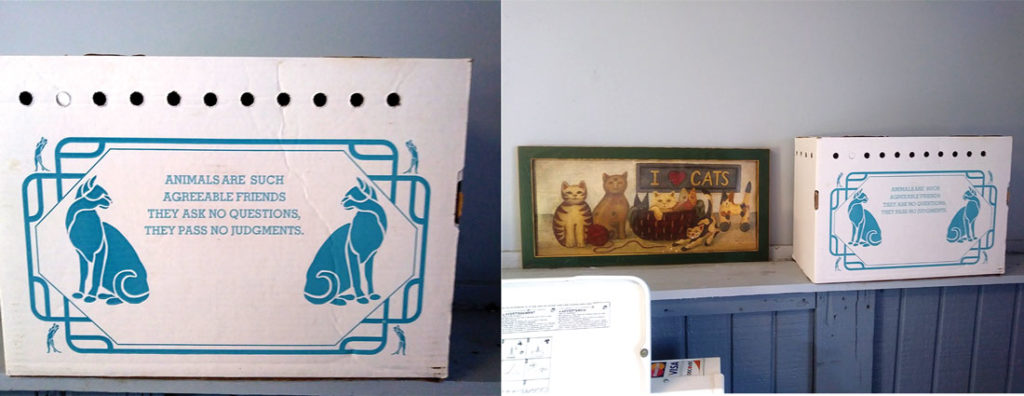
I walk back through the apartment complex and stop next to Kathy’s old porch, where she grew towering sunflowers and other flourishing plants every summer. The door is standing open, and a maintenance crew is already sweeping out her apartment. I haven’t seen Kathy since.
I stand there, struck by the lack of tangible traces that she has left behind. Across the top of Kathy’s old porch is a display of three words: “Faith, Hope, Love.”
They’re a reference to 1 Corinthians 13:13. “And now these three remain: Faith, hope and love. But the greatest of these is love.”



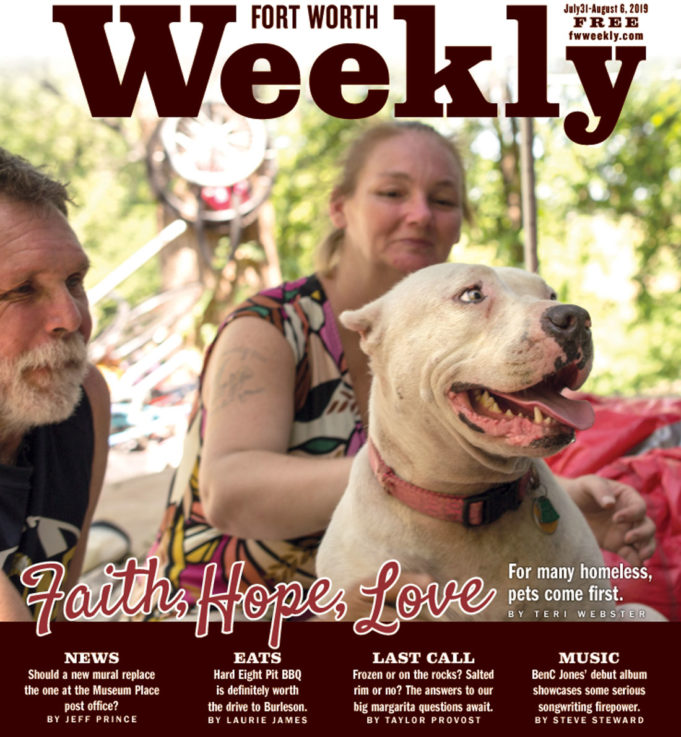









This is wonderfully written article! It touched my heart. Thank you for caring enough to tell this story.
Trying to contact the author of this article she did a wonderful job and have food for thought I am Sabrina this article is written about me